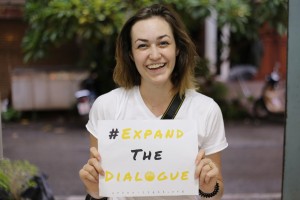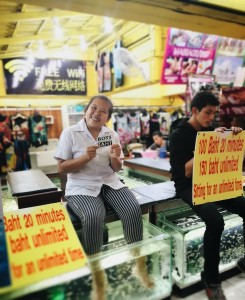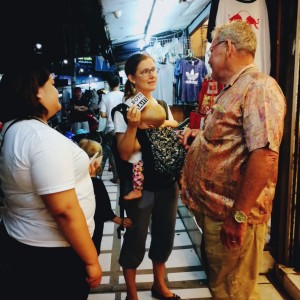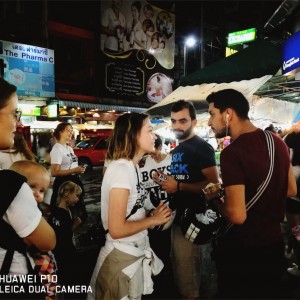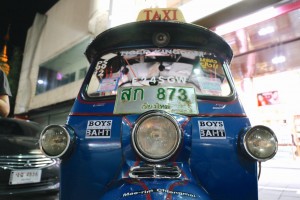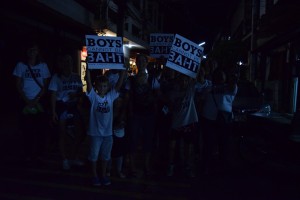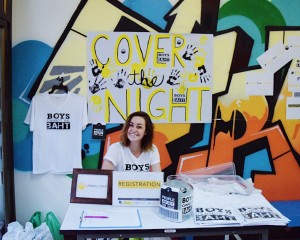A few weeks ago, I got to participate in a few different awareness events for human trafficking and Urban Light. All throughout college, I loved each and every opportunity I had to raise awareness for anti-trafficking organizations. It filled me with such a sense of purpose, to alert people to human rights abuses that perhaps they hadn’t heard of before.
But getting the chance to discuss these issues, this time alongside and on behalf of an organization I get to work with everyday, was something truly special.
The first event was with an organization called Remote Year. It’s a program where “digital nomads” can work remotely while visiting a new country every month. In every location, they have the opportunity to attend programs and seminars to learn more about the culture they’re stepping into and engage with the city in a way that goes beyond tourism.
It was at one of these programs that I got to speak, alongside Dear, Urban Light’s director of operations, and Dr. Matilda, Urban Light’s health care provider. A representative from HUG Thailand, an organization that focuses on eliminating trafficking from an online exploitation perspective, was there as well. Together, we gave a presentation that explained the work of our respective organizations, the clients we serve, the magnitude of the issue itself and the many ways, big and small, that each person can affect change.
It was a bit of a full circle moment for me. I first learned about human trafficking as a freshman in high school. Horrified, I did the only thing I knew how to do: I talked about it. I wrote a speech for my high school debate team, and spent the next year speaking on trafficking and trying to raise awareness at speech competitions around the state. After that experience, I knew I wanted to dedicate my career to the anti-trafficking movement. Now, nine years later, I’m back at the beginning of my journey, talking about it.
I know I’m biased, but I thought it was a fascinating presentation. Hearing from Dr. Matilda, Dear and HUG gave me new information and perspective that I didn’t have before – even on the work of Urban Light. For example, I’m learning more and more all the time how much technology and the internet impacts trafficking internationally. A man across the world, within the United States, can purchase sex or photos or live video or anything else from the safety and privacy of his own room. It’s seriously disturbing, yet these are the realities that our boys live daily. And it’s why organizations like UL and HUG are so incredibly important.
The second awareness event was Urban Light’s own, called Cover the Night. We invited our supporters and friends to UL’s headquarters on a Friday night, and after socializing over Thai snacks (sooo good), split up into two groups to hit the streets and share Urban Light’s work with everybody!
My group went to Chiang Mai’s Night Bazaar area and handed out “Boys Cannot Be Baht” stickers to the people we walked by. Engaging casual passerbys and starting conversations can be so hard, but is absolutely essential to the work of awareness. Each person responded differently – some looking away, others responding in admiration of UL’s work or shock at the exploitation our boys face. I even had someone hand me back the sticker after I told him what it was for! But you just have to keep going, and give everyone a chance. You can’t afford to be intimidated, because who knows who may need to hear what you have to say!
And those important conversations do happen. One of UL’s staff had an encounter with a man who admitted he’d bought sex from a boy the night before. He was confused and defensive – he insisted the boy hadn’t been trafficked or forced into anything. But that gave our staff member the opportunity to explain to him how sneaky coercion can be, how it can look like family obligation and a lack of opportunity rather than chains in a dingy basement. She was able to inform him of how vulnerable our boys are, and how the community turns a blind eye to their plight. When the conversation was over, the man asked for a second sticker.
My most important conversation that night was with a tourist couple. When I handed them a sticker and asked “did you know that boys can be victims of trafficking and sexual exploitation too?” the woman was instantly angry. She couldn’t understand why I would be advocating for boys when sex trafficking was a women’s issue and girls made up the majority of victims. So, I got to explain to her that the more research is done, the more boys are found to be victimized and sexually abused and exploited, and that because it is seen as a women’s issue, these boys are left without a way out. That makes them just as, if not more, vulnerable than some female victims, and they needed to be recognized if trafficking is ever going to end. I’m not sure if she completely understood or agreed with me, but she was more receptive to the idea at the conclusion of our conversation.
I know I often forget how important raising awareness is, and how difficult it is to convince people to care about something like this. Although I loved awareness events in college, I often grew frustrated that I couldn’t do something more. But here, I’ve found raising awareness to be among my more important jobs, especially considering that my skill set (mostly my English language abilities in this case, haha) lends itself that direction. I’m so grateful to have gotten to participate in these events.

